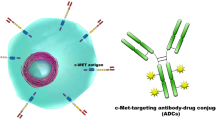Abstract
Capmatinib (Tabrecta™) is an oral, small molecule mesenchymal-epithelial transition (MET) inhibitor being developed by Novartis Oncology, under a license from Incyte Corporation, for the treatment of lung cancer. Capmatinib targets and selectively binds to MET, including the mutant variant produced by exon 14 skipping, and inhibits cancer cell growth driven by the mutant MET variant. In May 2020, oral capmatinib received its first global approval in the USA for the treatment of adults with metastatic non-small cell lung cancer (NSCLC) whose tumours have a mutation that leads to MET exon 14 skipping, as detected by an FDA-approved test. Clinical development for the treatment of glioblastoma, liver cancer, malignant melanoma, breast cancer, colorectal cancer, head and neck cancer and solid tumours is ongoing in several countries. This article summarizes the milestones in the development of capmatinib leading to its first approval.
Similar content being viewed by others
References
Zhang Y, Xia M, Jin K, et al. Function of the c-Met receptor tyrosine kinase in carcinogenesis and associated therapeutic opportunities. Mol Cancer. 2018;17(1):45.
Organ SL, Tsao MS. An overview of the c-MET signaling pathway. Ther Adv Med Oncol. 2011;3(1 Suppl):S7–S19.
Dimou A, Non L, Chae YK, et al. MET gene copy number predicts worse overall survival in patients with non-small cell lung cancer (NSCLC): a systematic review and meta-analysis. PLoS ONE. 2014;9(9):e107677.
Guo B, Cen H, Tan X, et al. Prognostic value of MET gene copy number and protein expression in patients with surgically resected non-small cell lung cancer: a meta-analysis of published literatures. PLoS ONE. 2014;9(6):e99399.
Lee GD, Lee SE, Oh DY, et al. MET exon 14 skipping mutations in lung adenocarcinoma: clinicopathologic implications and prognostic values. J Thorac Oncol. 2017;12(8):1233–46.
Novartis. TABRECTATM (capmatinib): US prescribing information. 2020. https://www.accessdata.fda.gov/drugsatfda_docs/label/2020/213591s000lbl.pdf. Accessed 15 May 2020.
US Food & Drug Administration. FDA grants accelerated approval to capmatinib for metastatic non-small cell lung cancer [media release]. 6 May 2020. https://www.fda.gov/drugs/drug-approvals-and-databases/fda-grants-accelerated-approval-capmatinib-metastatic-non-small-cell-lung-cancer.
Incyte Corporation. Incyte announces major collaboration and license agreement for two hematology-oncology programs [media release]. 25 Nov 2009. https://investor.incyte.com/news-releases/news-release-details/incyte-announces-major-collaboration-and-license-agreement-two.
Novartis. Novartis announces clinical collaboration to evaluate Bristol-Myers Squibb's novel immunotherapy in combination treatments for NSCLC [media release]. 6 Oct 2014. https://www.novartis.com/.
Liu X, Wang Q, Yang G, et al. A novel kinase inhibitor, INCB28060, blocks c-MET-dependent signaling, neoplastic activities, and cross-talk with EGFR and HER-3. Clin Cancer Res. 2011;17(22):7127–38.
Baltschukat S, Engstler BS, Huang A, et al. Capmatinib (INC280) is active against models of non-small cell lung cancer and other cancer types with defined mechanisms of MET activation. Clin Cancer Res. 2019;25(10):3164–75.
Drilon A, Cappuzzo F, Ou SI, et al. Targeting MET in lung cancer: will expectations finally be MET? J Thorac Oncol. 2017;12(1):15–26.
Lara MS, Holland WS, Chinn D, et al. Preclinical evaluation of MET inhibitor INC-280 with or without the epidermal growth factor receptor inhibitor erlotinib in non-small-cell lung cancer. Clin Lung Cancer. 2017;18(3):281–5.
Wolf J, Seto T, Han JY, et al. Capmatinib (INC280) in patients (pts) with METex14-mutated advances NSCLC: an update from phase 2 GEOMETRY mono-1 study. Pneumologie. 2020;74(S 01):134.
Heist RS, Garon EB, Tan DSW, et al. Accurate detection of METex14 mutations in non-small cell lung cancer (NSCLC) with comprehensive genomic sequencing: results from the GEOMETRY mono-1 study [abstract no. B11]. J Thorac Oncol. 2020;15(2 Supplement):S30–S3131.
Wu Y, Zhou Q, Zhang X, et al. Cluster trial: Ph2 biomarker-integrated study of single agent alpelisib, capmatinib, ceritinib and binimetinib in advNSCLC [abstract no. JCSE01.09]. J Thorac Oncol. 2018;13(10 Supplement):S311–S312.
Qin S, Chan SL, Sukeepaisarnjaroen W, et al. A phase II study of the efficacy and safety of the MET inhibitor capmatinib (INC280) in patients with advanced hepatocellular carcinoma. Ther Adv Med Oncol. 2019. https://doi.org/10.1177/1758835919889001.
Wu YL, Zhang L, Kim DW, et al. Phase Ib/II study of capmatinib (INC280) plus gefitinib after failure of epidermal growth factor receptor (EGFR) inhibitor therapy in patients with EGFR-mutated, MET factor-dysregulated non-small-cell lung cancer. J Clin Oncol. 2018;36(31):3101–9.
van den Bent M, Azaro A, De Vos F, et al. A Phase Ib/II, open-label, multicenter study of INC280 (capmatinib) alone and in combination with buparlisib (BKM120) in adult patients with recurrent glioblastoma. J Neurooncol. 2020;146(1):79–89.
Bang YJ, Su WC, Schuler M, et al. Phase 1 study of capmatinib in MET-positive solid tumor patients: dose escalation and expansion of selected cohorts. Cancer Sci. 2020;111(2):536–47.
Schuler M, Berardi R, Lim WT, et al. Molecular correlates of response to capmatinib in advanced non-small-cell lung cancer: clinical and biomarker results from a phase I trial. Ann Oncol. 2020. https://doi.org/10.1016/j.annonc.2020.03.293.
Esaki T, Hirai F, Makiyama A, et al. Phase I dose-escalation study of capmatinib (INC280) in Japanese patients with advanced solid tumors. Cancer Sci. 2019;110(4):1340–51.
Foundation Medicine Inc. FoundationOne®CDx: technical information. 2020. https://www.accessdata.fda.gov/cdrh_docs/pdf17/P170019S011C.pdf. Accessed 15 May 2020.
Author information
Authors and Affiliations
Corresponding author
Ethics declarations
Funding
The preparation of this review was not supported by any external funding.
Conflict of interest
During the peer review process the manufacturer of the agent under review was offered an opportunity to comment on the article. Changes resulting from any comments received were made by the authors on the basis of scientific completeness and accuracy. Sohita Dhillon is a contracted employee of Adis International Ltd/Springer Nature, is responsible for the article content and declares no relevant conflicts of interest.
Additional information
Enhanced material for this AdisInsight Report can be found at https://doi.org/10.6084/m9.figshare.12470114.
This profile has been extracted and modified from the AdisInsight database. AdisInsight tracks drug development worldwide through the entire development process, from discovery, through pre-clinical and clinical studies to market launch and beyond.
Rights and permissions
About this article
Cite this article
Dhillon, S. Capmatinib: First Approval. Drugs 80, 1125–1131 (2020). https://doi.org/10.1007/s40265-020-01347-3
Published:
Issue Date:
DOI: https://doi.org/10.1007/s40265-020-01347-3




